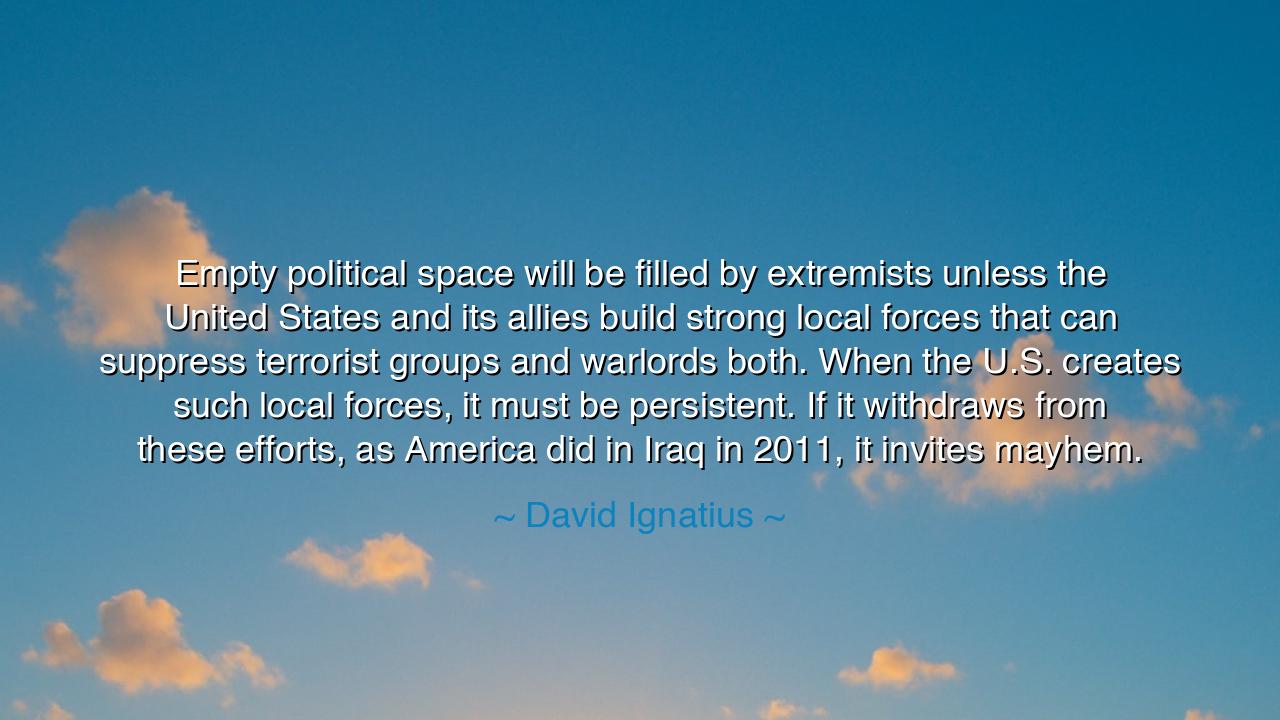
Empty political space will be filled by extremists unless the
Empty political space will be filled by extremists unless the United States and its allies build strong local forces that can suppress terrorist groups and warlords both. When the U.S. creates such local forces, it must be persistent. If it withdraws from these efforts, as America did in Iraq in 2011, it invites mayhem.






In the grand sweep of history, the vacuum of power and order left in the wake of a society’s collapse is always filled, whether by extremists, terrorists, or warlords. The words of David Ignatius are a stark reminder that the absence of authority is a dangerous space, one that beckons the forces of chaos to seize control. “Empty political space will be filled by extremists unless the United States and its allies build strong local forces that can suppress terrorist groups and warlords both,” he warns, emphasizing the vital role of persistent action in maintaining peace and stability. In the void left by vacuum of political power, it is often the most ruthless who seize the mantle, bringing with them destruction and discord.
Throughout the ancient world, the absence of stable governance led to the rise of chaos and violence. In the wake of the fall of the Roman Empire, Europe was plunged into a dark age, where warlords and marauding tribes filled the void left by a fragmented political structure. The Vikings, Huns, and Visigoths were not just conquerors—they were the forces that arose in the absence of order. Similarly, in Iraq and other modern regions, we see the same patterns play out. When the United States and its allies withdrew from Iraq in 2011, it created an opening that allowed extremists like ISIS to rise, spreading terror and violence across the land. The lesson from these ancient and modern experiences is clear: when authority falters, it is the forces of disorder that often fill the void.
But the struggle for stability is not merely about imposing control—it is about building local forces that are both capable and willing to uphold order in their own lands. Ignatius reminds us that the U.S. and its allies must not simply seek to impose their will from the outside, but to cultivate strong local forces—legitimate governments, militias, and law enforcement—that can confront the terrorists and warlords at the grassroots level. The importance of this effort cannot be overstated. It is through the creation of these local forces that a society regains its strength, its self-determination, and its ability to resist outside manipulation and extremist ideologies. These forces must not only be built but also sustained through persistent engagement and commitment, for without enduring support, the newly created systems of order can easily crumble.
The ancient Chinese knew well the wisdom of cultivating local strength. Confucius taught that good governance begins with the moral integrity of the people and the building of strong, virtuous leaders at the local level. The dynasties that thrived were those that recognized the importance of local governance as the foundation of the empire’s strength. This notion is still relevant today. The United States and its allies must understand that building a stable, self-sustaining force in a region requires more than just military action. It requires a deep, ongoing investment in local communities, economies, and institutions. This is a long-term commitment, not just a short-term intervention.
History also offers a stark warning for those who pull back too soon. The United States’ withdrawal from Vietnam in the 1970s is an example of how premature disengagement can lead to catastrophic consequences. After years of war, the U.S. left, believing that the South Vietnamese government could hold the line against the North, only to see it collapse under the pressure of communist forces. The fall of Saigon marked the end of South Vietnam, and the subsequent rise of a brutal regime. The lesson here is that the responsibility of maintaining order does not end with the withdrawal of external forces; it demands continued effort, even long after the initial conflict has subsided.
When Ignatius speaks of the need for persistence, he is calling for a long-term vision of peace, a vision that understands that true stability is not built on the shifting sands of military might alone. Rather, it is the building of a solid foundation—through education, governance, and community empowerment—that secures the future. The terrorist groups and warlords that rise in the absence of this persistent effort are not only fueled by violence and destruction, but by a profound lack of hope. When local populations are denied the means to defend themselves or prosper, the vacuum of despair is filled by those who prey on that hopelessness.
The lesson for us today, then, is both urgent and clear: the battle for peace is not a brief skirmish, but a long struggle that requires patience, commitment, and persistance. Nations that wish to create lasting peace must invest not just in military strength, but in the development of local forces, local communities, and local institutions. We must not withdraw when the fight seems hard; rather, we must stay the course, knowing that only through sustained effort can we create a world where terror and chaos are replaced with justice and order. Just as the greatest empires in history flourished through the strength of their local institutions, so too must modern civilizations build a lasting peace that is rooted not in fleeting interventions but in the strength of the people themselves.






AAdministratorAdministrator
Welcome, honored guests. Please leave a comment, we will respond soon